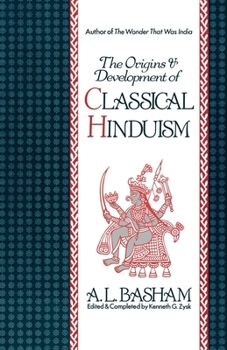The Origins and Development of Classical Hinduism
Select Format
Select Condition 
Book Overview
The late A.L. Basham was one of the world's foremost authorities on ancient Indian culture and religion. Modeled on his monumental work The Wonder That Was India, this account of the origins and development of classical Hinduism represents a lifetime of reflection on the subject, and offers an intriguing introduction to one of the richest of all Asian traditions.
Synthesizing Basham's great knowledge of the art, architecture, literature, and religion...
Format:Paperback
Language:English
ISBN:0195073495
ISBN13:9780195073492
Release Date:December 1991
Publisher:Oxford University Press, USA
Length:208 Pages
Weight:0.40 lbs.
Dimensions:0.5" x 5.4" x 8.7"
Customer Reviews
3 ratings
Thorough, not always scintillating - but short and thorough
Published by Thriftbooks.com User , 14 years ago
While Basham's writing style may not be the most scintillating, this book is a good concise overview on the development of the Hindu religion. Touching on the roots of ancient Harappan culture, and the Vedas, Basham also manages to introduce the ancient gods, to introduce Jainism as well, and finally to discuss the Mahbharata, the Ramayan, and Bhagavad-Gita. Readers who wish for a first brush meeting with Hindu culture and religion will still find this a reliable supplement to other very good readings - such as Fred Clothey's Religions of India.
A Brief But Lucid Introduction
Published by Thriftbooks.com User , 22 years ago
One of the worst problems in getting a grasp of Indian religion and philosophy is that there is so much of it. If you are a dilettante, such as I, trying to keep the Vedas, Upanishads, Sutras, and their derivatives in some kind of mental order is a task that distracts one from the real reasons for such study. In addition, the terminology is often daunting, especially for a beginner. Yet the ideas of India and it's neighbors have had influence far beyond their countries of origin, and a good basic understanding grants tremendous insight into the workings of the human spirit.Fortunately, there are many writers who have dedicated themselves to the explication of Indian philosophy. Almost too many. A short visit to the book store reveals many shelves of material, most of which entice and bewilder. Of course, this isn't surprising given the vastness of the subject matter. What is really needed it a bit of a roadmap, with enough detail to point the way to areas of interest. Which is where Arthur Basham's thin little book on classical Hinduism fits perfectly.Basham is both a scholar of ancient Indian culture and religion and one of its best proponents. His style is very clear and lucid, even when the subject matter is a bit dry. This volume is actually a collection of a series of his lectures put together in 1989 and is quite accessible. These span a period of time from about 2700 BCE through to the Common Era and beyond. More than Hinduism itself is discussed. Buddhism and Jainism come under scrutiny, although not as deeply as the main subject area. The editor (Kenneth Zysk) has appended a fine bibliography which will help guide the reader in further pursuits. The size and style preclude excessive detail, but Basham carefully steers clear of oversimplification. The sections proceed in chronological order, discussing the culture, the writings, and the important themes and ideas. It is very interesting to see how Hinduism takes form and moves through many stages of development, flirting with theism, monotheism, and every other variation in between, respecting many different beliefs instead of hammering out a single doctrine. This is a perfect starting out book. Also recommended is Basham's justifiably popular 'The Wonder That Was India.'
A Scholars view written for general readers
Published by Thriftbooks.com User , 22 years ago
This is a rare book that combines deep and original scholarship with a style that makes it accessible to a general audience. The book is a collection of lectures so each chapter is self-contained and may be read on its own. While I suspect that some of the conclusions may be controversial, the arguments in favor are presented concisely and logically. This book is not intended to be an introduction to Hindu philosophy; however, anyone with a casual knowledge of stories from the Ramayana and the Mahabharata will enjoy this book.





